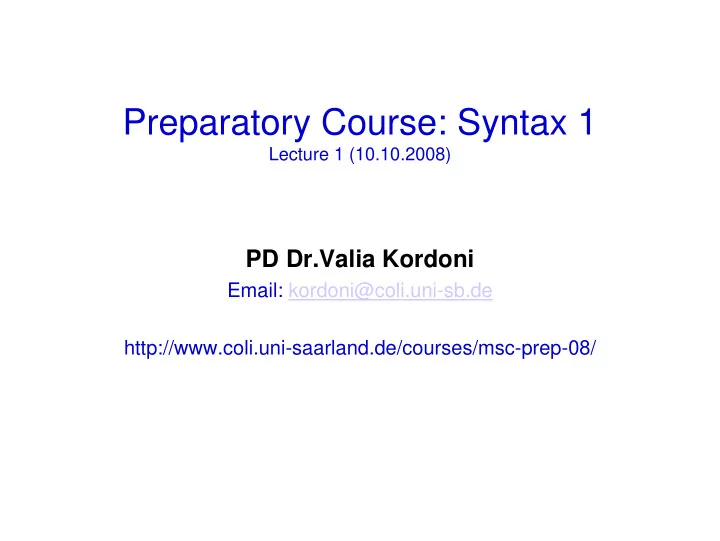

Preparatory Course: Syntax 1 Lecture 1 (10.10.2008) PD Dr.Valia Kordoni Email: kordoni@coli.uni-sb.de http://www.coli.uni-saarland.de/courses/msc-prep-08/
Syntax: What does it mean? We can view syntax/syntactic theories in a number of ways, two of which are the following: • Psychological way/model: syntactic structures correspond to what is in heads of speakers and hearers • Computational way/model: syntactic structures are formal objects which can be mathematically treated/manipulated Preparatory Course – Syntax Lecture 1 (10.10.08) 2
Syntactic Analysis • Focus on collection of words and rules with which we generate strings of those words, i.e., sentences (generative grammar) • Syntax attempts to capture the nature of those rules 1. Colourless green ideas sleep furiously. 2. *Furiously sleep ideas green colourless. • What generalisations are needed to capture the difference between grammatical and ungrammatical sentences? Preparatory Course – Syntax Lecture 1 (10.10.08) 3
Phrase Structure Grammars (PSGs) • Grouping, or constituency, is used (1) Sue gave Paul an old penny. Preparatory Course – Syntax Lecture 1 (10.10.08) 4
Phrase Structure Grammars (PSGs) S Phrase- structure VP Grammar NP NP V NP Det N A N Sue gave Paul an old penny. S → NP VP Preparatory Course – Syntax Lecture 1 (10.10.08) 5
Phrase Structure Grammars (PSGs) S Phrase- structure VP Grammar NP NP V NP Det N A N Sue gave Paul an old penny. S → NP VP Preparatory Course – Syntax Lecture 1 (10.10.08) 6
Phrase Structure Grammars (PSGs) S Phrase- structure VP Grammar NP NP V NP Det N A N Sue gave Paul an old penny. S → NP VP VP → V NP NP Preparatory Course – Syntax Lecture 1 (10.10.08) 7
Phrase Structure Grammars (PSGs) S Phrase- structure VP Grammar NP NP V NP Det N A N Sue gave Paul an old penny. S → NP VP VP → V NP NP V → gave Preparatory Course – Syntax Lecture 1 (10.10.08) 8
The Transformational Tradition Roughly speaking, transformational syntax (GB = Government and Binding, P&P = Principles and Parameters,...) has focused on the following: • Explanatory adequacy: the data must fit with a deeper model, that of universal grammar • Psychological: does the grammar make sense in light of what we know of how the mind works? • Theory-driven: data should ideally fit with a theory already in place (often based on English) Preparatory Course – Syntax Lecture 1 (10.10.08) 9
The Transformational Tradition (cont.) • Universality: generalisations must be applicable to all languages • Transformations: (surface) sentences are derived from underlying other sentences, e.g., passives are derived from active sentences Preparatory Course – Syntax Lecture 1 (10.10.08) 10
The Transformational Tradition (cont.) Sue gave Paul an old penny S IP S VP NP-Q Aux NP NP V NP What did Sue give Paul ___ Preparatory Course – Syntax Lecture 1 (10.10.08) 11
The Transformational Tradition (cont.) But this kind of theory does not lend itself well to computational applications Preparatory Course – Syntax Lecture 1 (10.10.08) 12
Making it computational How is a syntactic theory useful for computational linguistics? • Parsing: take an input sentence and return the syntactic analysis and/or state whether it is a valid sentence • Generation: take a meaning representation and generate a valid sentence => Both tasks are often subparts of practical applications, such as Machine Translation (MT) and Dialogue systems, for instance Preparatory Course – Syntax Lecture 1 (10.10.08) 13
Computational Needs To use a grammar for parsing or generation, we need to have a grammar that meets several criteria: • Accurate: gives a correct analysis • Precise: tells a computer exactly what it is that one wants it to do • Efficient: able to parse a sentence and return one or only a small number of parses • Useful: is relatively easy to map a syntactic structure to its meaning => These needs are not necessarily why the computational formalisms were developed, but they are some of the reasons why people use them. Preparatory Course – Syntax Lecture 1 (10.10.08) 14
Recommend
More recommend